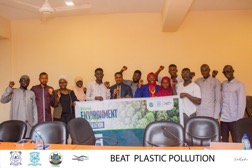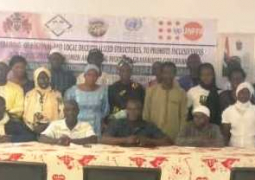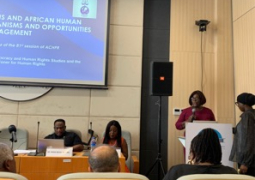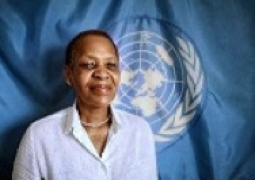
World Environment Day is celebrated annually on 5th June to encourage awareness and action for the protection of the environment.
WED is supported by many non-governmental organisations, businesses, government entities, and represents the primary United Nations outreach day supporting the environment.
The theme for this year’s celebration is “Beat plastic pollution.”
At the event, Omar Mbaye, executive director of SAG, said WED celebration was established purposely to create awareness and build capacity of people to be environmentally conscious; understand their surroundings and know its impacts on their lives and livelihoods.
He reminded that plastic has boosted the socio-economic growth of several countries around the world, saying plastic materials are used for packaging of food items, medical drugs and also help to provide employment to people.
The production of more plastic bags, he said, is attributed to the increase of world pollution and that this could affect the world’s marine ecosystem; thereby becoming a threat to humans.
The environmental activist thus reminded that there are negotiations among world leaders to put mechanisms in place to lessen the impact of plastic pollution across the globe.
"The Basel, Rotterdam and Stockholm conventions are multilateral environmental agreements, which share the common objective of protecting human health and the environment from hazardous chemicals and wastes."
To that end, he indicated that there are global negotiations happening all over the world now to reflect on the issue of the Basel, Rotterdam and Stockholm (BRS) Conventions.
Those conventions, he added, were basically established to highlight trans-boundary movement of chemicals; the prior informed consent and joint implementation in management of chemicals.
He equally observed that Africa is not producing more plastic bags like other continents, but despite that plastic pollution affects Africa most.
Maimuna K. Jallow, minister for Agriculture for UTG, said commemorating the World Environment Day through sensitising would help in mitigating the hazard of plastic pollution in The Gambia.
“We are facing lots of problems when it comes to plastic pollution,” she said.
She revealed that the UTG Student Union is committed to combating plastic pollution, making reference to the fact UTG has several dustbins and it also has bins specifically for plastic bags.
This strategy, she said, is to ensure the plastic waste dumped in that bin will be taken to recycling machines to reprocess them to valuable material and return them to the masses.
"To avoid plastic pollution in the environment, I advise all to throw all plastic bags in dustbins rather than throwing them on streets."
Presenting on the role of Civil Society Organisations on plastic pollution, Muhammed Nyass, coordinator for Gambia Ocean Hero's, said as plastic pollution is hazardous to the environment, there is a need for all to figure out measures to combat it amicably.
“As citizens of this country, we must complement government efforts by playing our part in the fight against pollution and plastic pollution in particular,” Nyass, also a UTG student said.
He further said there is a greater need for CSOs to complement one another in the fight against plastic pollution to ensure all attain the sustainable development goal.
“If an organisation focuses on cleansing the beach, another organisation should focus on recycling the waste materials collected by that organisation,” he said.
He equally stressed the need to sensitise the grassroots on plastic pollution in schools and rural communities.





